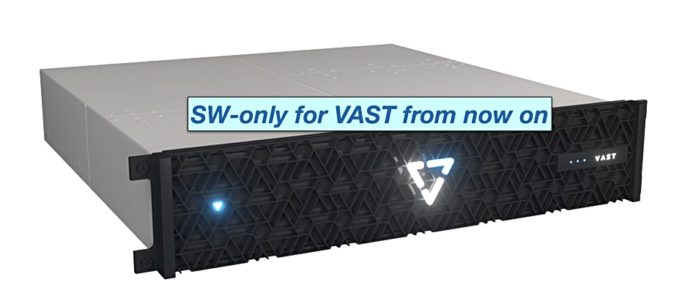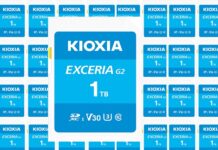VAST Data, the high performance storage startup, is to stop selling its own hardware. It will concentrate instead on selling software on a subscription basis, and will certify hardware appliances built by Avnet.
VAST Data raised $100m at a $1.2bn valuation in April 2020. This was a meteoric rise for the company which just a year earlier made its public debut with the single tier Universal Storage platform. The hardware element was a high-end array, incorporating QLC flash drives, Optane metadata and write-staging SSDs, NVMe over Fabrics access and a data reducing software stack. The company claims the scale-out system is exabyte-capable and has costs down at the disk drive capacity level and not those of general all-flash arrays.
In January this year, the company introduced a software subscription service called Gemini. Previously, it sold software coupled to its own hardware, on a perpetual license basis. The company said it has already delivered dozens of petabytes to customers under the scheme.

“Instead of purchasing hardware and software together and being caught up in an endless refresh cycle as we’ve seen for the past 30 years, Gemini offers the freedom, flexibility, and simplicity, all at an affordable cost, that organisations need to deploy an infinite storage lifecycle,” Renen Hallak, VAST Data founder and CEO, said today in a press statement.
According to VAST, Gemini enables customers to to expand performance and capacity independently and license capacity according to their specific requirements. Customers purchase a single appliance-based system with the seller supplying claimed at-cost hardware and the Gemini subscriptions for the VAST Data software. This software is not tied to hardware generations. Gemini also includes a ‘Co-Pilot’ – a level 3 VAST engineer for each customer.
The Gemini scheme includes an unconditional 60-day right to return the hardware and software.
A Silken comparison
VAST is following in Silk’s footsteps. The rebranded Kaminario all-flash-array business exited the hardware business in January 2018. Silk did a deal with Tech Data for it to provide the K2 and K2.N hardware, with Kaminario providing the Vision OS, Clarity analytics software and Flex automation and orchestration software.
Like VAST, Kaminario said at the time that customers would get the software-defined economics and flexible consumption typically seen only by hyperscale cloud providers. Shortly afterwards Kaminario supplied its Vision OS software on a subscription basis to run in the Amazon, Azure and Google public clouds.
Q & A
We asked VAST some questions about the Gemini scheme.
Blocks & Files: Why exit the HW business?
VAST: The change here is that we are now no longer in the purchasing path, which means we are also now no longer bound to the financial constraints of being measured on hardware margin contribution, and that allows us to align our business directly with the business of our customers. Our customers can:
- Refresh as often or as little as they’d like without worrying about their previous hardware/software investments
- Purchase as little as 100TB and scale as their data grows
- Purchase for as little as one year
- Over-purchase hardware to achieve a specific performance target (as many of our customers have already done) without licensing the capacity until they need it, making it very affordable to accelerate without paying the classic software tax
One VAST customer in the financial services industry had a fixed performance requirement for an additional 350GB/sec but did not require the full ~7PB capacity for this investment. With Gemini, they were able to asymmetrically add hardware (at cost) and license only the capacity they needed. In this case, they saved on hardware acquisition costs, software licensing costs, eventual data migration costs (as they grow), and added capacity on-premises ready to license as their needs require it. They immediately saved over 40 per cent versus a legacy acquisition model.
Blocks & Files: Which hardware?
VAST: The appliances we use are assembled by Avnet to the specification of our R&D team. This allows us to preserve the appliance experience that our customers love, and eliminate much of the complexity and integration hassle that is often synonymous with pure software-defined storage plays.
Blocks & Files: How is it specified?
VAST: For hardware, it’s the same as VAST systems have always been configured:
- NVMe Enclosures hold the state of the system, with our mix of QLC Flash and Storage Class Memory
- NVMe Switching (Ethernet or InfiniBand)
- X86 Servers running VAST Containers
All of this is sourced by customers at cost, who benefit from the buying power of VAST’s customers as part of the pricing that our manufacturer locks in for our collective of customers.
In addition, Gemini software subscriptions are sold much more incrementally than in the past:
- 100TB and full enclosure licenses
- 1-10 year agreements
Blocks & Files: How is it certified?
VAST: Because Avnet provides the solution pre-configured, it arrives on a customer’s door as an integrated appliance and VAST handles all aspects of product support.
Blocks & Files: How does this differ from Silk?
VAST: We have not studied Silk with respect to this offering.
Blocks & Files: Don’t customers now have to make separate hardware and software purchases, meaning more work by them?
VAST: Actually, this is not the case as:
- We prescribe the configuration
- One purchase order is provided to Avnet
- Avnet sends only the software portion of the order to VAST, and we work together to ensure that the integrated solution is preconfigured and shipped ready to install.
What Gemini doesn’t change is the same industry-leading experience that comes with VAST’s Universal Storage platform – customers interact with VAST for any hardware or software issue. This experience is the reason why customers buy VAST and then they buy a lot more. On average, VAST customers seamlessly add up to 3X their initial purchase within their first year.
Blocks & Files: Why is this good for customers?
VAST: Gemini provides several key benefits:
- Savings: Buy what you need when you need it. By not having to answer to some hardware-derived gross margin percentage, VAST can focus on what the customers need and not what we’d have to show to the board. Once the business is all software, it’s easy to be much more incremental, but it’s also easier to go after extremely large (hyperscale) projects that would have otherwise been too challenging for us to reach.
- Simplicity: CoPilots now handle every aspect of monitoring, upgrading, expanding, and refreshing customer infrastructure such that it’s a low-touch/no-touch experience for customers. We’ve got customers now scaling clusters to 50PB and beyond, and when you get to that level of scale, it just makes more sense for us to handle the heavy lifting because our team knows the product best.
- Flexibility: Refresh whenever you like to get the best use of hardware in the way that’s right for your business. Stop endlessly migrating and just scale via an asymmetric architecture.
Blocks & Files: Will VAST software run in the public cloud?
VAST: Stay tuned.








